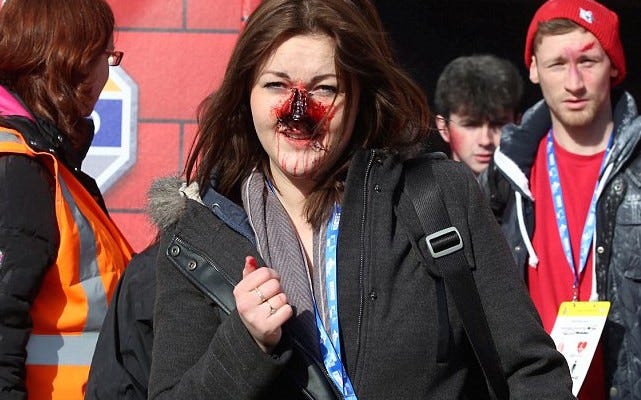Drills
In 2005, on the day of the incident now known as 7/7, a man named Peter Power appeared on ITV News to say that he had been running an exercise that morning that,"almost precisely," envisioned the attack.
"We had to suddenly switch an exercise from fictional to real."
That afternoon, isolated in my awareness of the 9/11 lies, I was listening as he told Peter Allen on BBC Radio 5 Live,
"At half-past nine this morning we were actually running an exercise for a company of a thousand people in London based on simultaneous bombs going off precisely at the railway stations that happened this morning."
Allen responded almost incredulously, “To get this quite straight -you were running an exercise to see how you would cope with this and it happened while you were running the exercise?”
This moment is reminiscent of CNN anchor, Garrick Utley, reporting that, “a hijacker’s passport was found blocks from the World Trade Center crash site, if you can believe that.”
Adding to the coincidences, a year earlier Peter Power had appeared on a BBC Panorama programme entitled, 'London under attack,’ that addressed the scenario of explosions on three tube trains and one road vehicle.
In a similar coincidence, confusion generated by hijack drills running on 9/11 bedevilled the emergency response to the real events with telephone operators asking, "is this real world or exercise?"
These are not isolated coincidences. In 2014, one researcher compiled a list of
"63 government drills that have gone live since 1993." The list includes events such as 7/7 in which there were mass casualties and deaths.
Crisis Actors
A crisis actor is a term used to describe a paid participant in a drill simulation for training emergency, military, security, or intelligence services.
Agency Crisiscast provides, "medically accurate film grade trauma make up on...psychologically trained amputee actors."
Even to the prepared viewer, Crisiscast’s special effects are so realistic that its website includes a viewer discretion warning. Would we be able to tell the difference if footage of these simulated injuries was presented to us as real?
On 23rd March 2016, an article appeared that stated,
"Hundreds of emergency workers from four countries took part in Europe’s largest disaster drill that came weeks before the recent terror attack."
The previous day, bombings in Brussels were reported to have killed 32 people and injured 340. Looking through the pictures in the article it would be very difficult to discern the fakery if footage of the drill was presented as real.
Similar simulations that include overseas military engagements and domestic shootings would also be difficult to discern if they were presented as authentic.
Jonathan Day, reporting for BFBS Forces News notes of the drills he observed that, “the parallels to recent attacks in the real world are clear.”
A spokesman for Iqarus crisis response explains, “Some of the scenarios we did today were lone shooter scenarios and that's happened in the UK lately, so you know, we do pick up on the news, we do pick up on current news feeds, and we will change scenarios appropriately to make sure that they're current.”
Day informs us,"Iqarus’ plan is now to develop this Hollywood style in open training centers across the world and give as many people as possible the chance to experience this unique facility."
Staged events
In the 2013 BBC Panorama episode ‘Saving Syria's Children,’ actors apparently simulated injuries from a gas attack that was blamed on the government of Syrian President Assad. Research by Robert Stuart strongly suggests that British broadcasters knowingly presented this fabricated story involving purportedly injured children for propaganda purposes.
In the US, alterations to the Smith Mundt Act in 2012 made it legal to propagandise the domestic audience where previously it had only permitted the state to produce such material for foreign audiences. Aisling O’Loughlin acknowledged this legislation and its apparent intended purpose to provide fabricated news to propagandise Americans when she said, “I know there is some law in the US, but we don’t have it in the UK and Ireland. News is not the fiction department.”
Are we to believe that the US changed its legislation to permit the fabrication of news stories but has not made use of this provision? Or do we believe that the legislation was changed because it was required and has since been used to fabricate news? If US news stories have been fabricated, where have these stories been reported as fabricated in the British and Irish media? Have fabricated stories been reported as real?
Duping Delight
In a presentation, Pamela Meyer examines, “the manners and ‘hotspots’ used by those trained to recognize deception.” She considers how the truth often, “leaks through,” in a person’s body language and mannerisms. This can include a, “smile at the delight in getting away with it,” known as duping delight.
Is this something for which we should look out?
Is it socially acceptable to question what we might perceive as the fake crying of a fake Health Secretary celebrating the introduction of fake vaccinations in a television interview for the fake media? Or should we be respectful of his emotions as a victim of horrendous and overwhelming circumstances?
Matt Hancock was responding to a report of a William Shakespeare from Stratford being given the second fake covid vaccination in the UK.
Is it acceptable to notice the incongruity of the smirks of a fake philanthropist impressing fake vaccinations on the world’s population via the fake media that he funds?
Can we read anything into the anomalous smile of a former President making a eulogy at a funeral?
Can we question why a famous Hollywood actor might grin when discussing the apparent death of a ten year old girl at a school shooting?
Or are the suspicions these incidents provoke too scandalous to be given voice?
As Miri Finch points out, research suggests that people are ill-equipped to see through lies, but this does not mean that it is impossible. People discover lies every day, often through feelings, intuition, interpretations, and awareness of context, all of which may be inadmissible in a court. Although in so many ways we now defer to machines, ordinary people were once the only lie detectors.
Investigators routinely uncover lies. They evaluate an entire body of information including forensic and witness evidence along with any relevant context, criminal history, motive, and the analysis of statements. Obviously if any of this evidence or analysis is weak it can be rejected but even circumstantial evidence can provide a lead.
Pamela Meyer asks us to compare the video accounts of two apparently grieving mothers. In the case of Diane Downes, Meyer invites us to look for a, “discrepancy between (the) horrific events that she describes and her very, very, cool demeanor.”
What would we think of an investigator who ignored such a discrepancy for fear of causing emotional distress to a supposed victim?
Although people may be ill-equipped to adjudge a lie, it also seems that many people are susceptible to hypnotism and some are not. Apparently a hypnotist and his audience can laugh in the face of subjects of hypnosis without breaking the trance.
On 7/7, assuring the listeners of his surprise at conducting a drill that corresponded with unfolding events, Peter Power told BBC radio that,
“I still have the hairs on the back of my neck standing upright.” On ITV, he was interrupted by the interviewer before he could finish delivering the same line. On the radio, using an interesting choice of words he stated,
“We had a room full of crisis managers, for the first time they met and so within 5 minutes we made a pretty rapid decision -this is the real one.”
Should these statements provoke suspicion or inquiry?
As Meyer warns us, “Lying is a co-operative act. A lie has no power whatsoever by its mere utterance -its power emerges when someone else agrees to believe the lie."










Arghhh why isn’t this compulsory reading/viewing?!
I’m struggling so much at work trying to share this information in tiny pieces. Mostly they think I’m a bit ‘out there’ but this week I introduced the subject of BJ’s fake hospitalisation. The boss initially mocked me, one girl was silent and after what felt like an age another piped up “actually I don’t think he had covid, I think that was a lie”. Boom 💥
I had one person onside, I was no longer the lone nut. The boss went silent.
It’s bloody exhausting though.
I often wonder if; when the snake oil salesman, who answers to the name of Piers Morgan, sits on his chubby bottom, in the make up dept. at some ungodly hour of the night, to have his tummy rubbed and nappy changed — before going live on ‘festering Britain today’ or ‘hallelujah UK, or whatever; that he and the rest of the crew know exactly that they’re being paid to keep the wool firmly in the eyes of the great unthinking masses. They - who need a huge hit of toxic and contentious rhetoric each morning, before heading on to their antisocial media accounts, for some full on poisonous tribal diatribe concerning: literally, fuck all of any great significance.
Crisis Actors. Bloody thousands of ‘em. Bo-Jo, Nick Halfcock. Six-hundred odd half wits in the Palace, by the river. News readers. TV Sch-lebbs. WEF spokespersons. Mr. And Mrs McCann. The man from Del Monte. Milk Tray boy. Bill and Ben. Script writers on the Ten o’clock news. Billy Smarts Circus. Lenny Henry. Eastenders. Coal from Columbia. Lamb from New Zealand. Songs of Praise… etc. etc.
It’s a veritable hoax within a conundrum, wrapped in nonsense, and gently gaslit on a medium heat, indefinitely. To say the whole wretched shitshow is duplicitous is an understatement.
And yet the supposed reality; what we’re encouraged to believe is real, is in fact more fabricated, more preposterous than one could even begin to imagine. Moon landings. Renata, ( Elton John’s ex wife) wearing a piece of cloth on your face; to protect others, ( but not if you’re sitting down, eating food)?) men having breast cancer!?#¥ Sir Kneel Stalin (yes. Just him) .. off shore companies; and what must be tantamount to hundreds of millions of pounds worth of spanking new (and empty) real estate - all along the Thames. (The prices creeping up, every few months.?!). Nothing to see here, though..
Btw, simply by writing this; I’m expending energy, making my carbon footprint much larger: and effectively burning up the planet. Possibly time to tune into a little YouTube video: Jordan Peterson, perhaps. god, it’s all this talk of hot air and men keeping their rooms tidy and not getting involved in crisis acting. Or worse: listening to Neil Oliver. Yawn. Life’s too short to peel a pepper. Or believe only half of what you see, and anything I say… Good Morning Britain !!?!